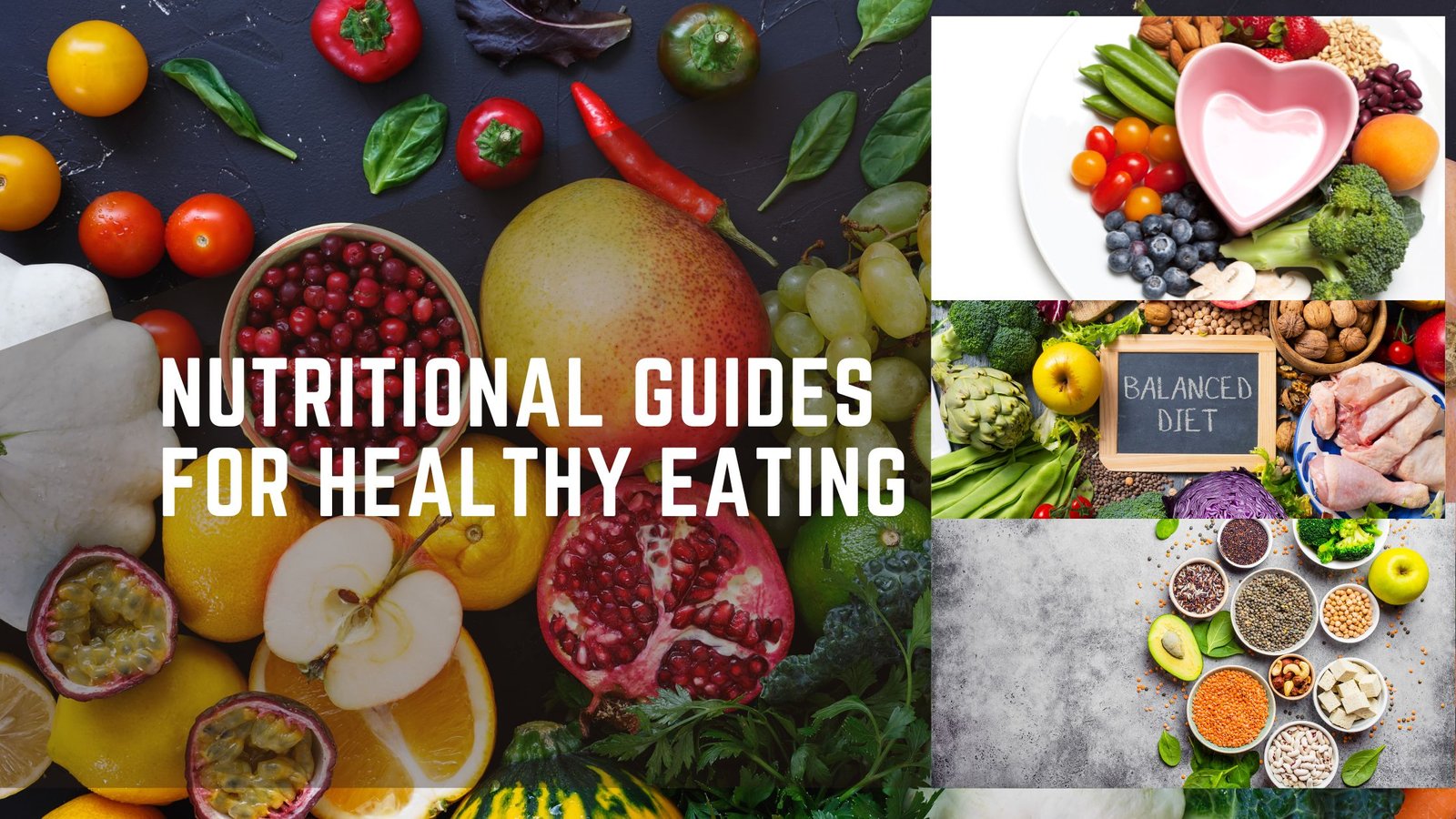Why nutritional guides are important for healthy eating
Eating a healthy, well-balanced diet is important for staying healthy and happy. The proteins, vitamins, and minerals that the body needs to work right are all found in a healthy diet. But there are so many foods out there now that it can be hard to figure out what to eat and how to make the healthiest choices.
That’s where food tips come in handy. The goal of these guides is to give you the information you need to make smart choices about your food. They give a lot of information about the nutrients in different foods and also give advice on how much to eat and how to eat in general.
Usually, health leaders or groups, like government agencies or professional associations, come up with nutritional guides. They come from scientific study and are updated often to include the newest nutrition research. These guidelines are often shown visually, like food pyramids or plates, which makes it easier for people to understand and follow the advice for their own eating habits.
One great thing about nutritional guides is that they help people understand how important it is to eat a range of foods in a balanced way. They give you information about the different food types and how they affect your health as a whole. For instance, a nutrition guide might say that you should eat a certain amount of fruits and veggies every day because they are full of vitamins, minerals, and antioxidants that help your immune system work better and lower your risk of getting chronic diseases.
Not only do food guides stress the importance of balance and variety, they also stress the importance of moderation. They tell people how much food to eat and help them understand the idea of energy balance, which is the link between the calories you eat and the calories you burn by exercising. People can make sure they are eating the right number of calories for their age, gender, and level of exercise by following the advice in nutritional guides.
Also, nutritional tips can help people choose foods that are better for them when it comes to certain nutrients. They tell you how much of different foods, like carbs, proteins, fats, vitamins, and minerals you should eat every day. This can be very helpful for people who have special dietary needs, like those with certain medical problems or food restrictions.
In general, nutritional tips are very important for encouraging people to eat healthily. They give people the information and tools they need to make smart choices about what they eat, which is good for their health. Individuals can improve their general health and lower their risk of getting chronic diseases linked to poor nutrition by following the suggestions in these guides.
To make smart choices about what to eat, we need to understand nutritional facts. By looking at a food’s macronutrient makeup, we can figure out how it will affect our health and well-being as a whole. For example, carbohydrates can be broken down into two groups: simple and complicated. Simple carbs, which are found in drink and candy, are broken down quickly and give you a boost of energy. Complex carbohydrates, on the other hand, are broken down more slowly and give you energy all day. You can find them in whole grains and veggies.
Animal proteins are another important element. They are what our bodies are made of. In order to heal tissues, help muscles grow, and make enzymes and hormones, they are responsible. Also, it’s important that the protein is good. Meat and dairy are good sources of proteins because they have all the necessary amino acids our bodies need. Some amino acids may be missing from plant-based proteins like beans and legumes, but they can be mixed with other plant-based foods to make a full protein source.
In popular society, fats are often seen as bad, but our bodies need them to work right. They keep our organs warm and safe, help our bodies receive vitamins that dissolve in fat, and give us energy that lasts for a long time. However, not every fat is the same. Some fats, like those in butter and fried foods, can make you more likely to get heart disease. But unsaturated fats, which can be found in foods like nuts and bananas, can be good for your heart if you eat them in moderation.
Besides giving information about macronutrients, nutritional information also gives information about vitamins. Some of these are vitamins and minerals, which our bodies need in smaller amounts but are still necessary for them to work right. Vitamin C, for instance, helps the nervous system and makes collagen, and calcium is important for bone health. By knowing what micronutrients are in the food we eat, we can make sure we’re getting all the nutrients we need every day and avoid any deficits.
Learning about nutrition gives us the power to make smart decisions about what we eat. If we pay attention to the macronutrients and micronutrients in the food we eat, we can make a healthy eating plan that fits our needs and is good for our general health.
Better health for digestion
It may be good for your digestive health to follow nutritional tips. These guides often stress how important it is to eat foods that are high in fiber, like whole grains, fruits, and veggies. Fiber helps keep your bowel movements normal and keeps you from getting constipated. Also, nutrition guides might suggest foods that are high in probiotics, like yogurt and fermented veggies, which can help keep your gut microbiome healthy and make digestion easier.
Immune system that is stronger
Your immune system will be better if you follow nutritional guides. Many of these guides say that you should eat a wide range of fruits and veggies that are high in antioxidants, vitamins, and minerals. These nutrients are very important for keeping the immune system healthy and protecting the body from getting sick. Following these tips will help your body’s natural defenses work better and lower your risk of getting sick.
Is better for sleep
Eating right is closely linked to getting better sleep. Some nutrition guides may say to stay away from sugary and caffeinated foods right before bed because they can make it hard to sleep. Instead, they might tell you to eat foods that help you sleep, like complex carbs and foods high in serotonin, like bananas and turkey. If you follow these tips, you can get better sleep and sleep longer, which will make you feel better generally.
Better mental health and mood
Your mental health and happiness can improve if you eat a healthy, well-balanced diet like nutritional guides say you should. Omega-3 fatty acids, B vitamins, and magnesium are some of the nutrients that have been shown to be important for brain health and the release of neurotransmitters that control mood. By eating these nutrients, you may be able to lower your anxiety and depression symptoms and improve your general mental health.
Health Benefits in the Long Run
Lastly, following food tips can be good for your health in the long run. If you start eating a healthy, well-balanced diet early in life and stick to it, you can lower your chance of getting chronic diseases and live longer overall. Nutritional guides are very helpful because they tell you how to choose healthy foods and make sure that you are giving your body the right nutrients for good health.
Write down what you eat
Keeping a food log is a good way to keep track of your progress and make sure you’re following the advice in nutrition guides. Make a list of everything you eat and drink during the day, along with how much you ate. This will help you find themes or places where you might need to make changes.
7. Make food at home
When you cook at home, you have complete power over the foods you use and the ways you cook them. If you cook your own meals, you can be sure to use fresh, whole foods and stay away from added sugars, unhealthy fats, and too much salt. Also, cooking at home can be a fun way to try out new tastes and recipes.
8. Drink enough water
It is important for your health to drink enough water, and it also helps your body do its job. During the day, make sure you drink enough water to stay fresh. Instead of drinks with a lot of sugar, choose water, herbal teas, or flavored water to make it taste better.
Learn to eat with awareness
Don’t rush through your meals. Instead, enjoy each bite and pay attention to when your body tells you it’s hungry or full. Being mindful when you eat means being in the present moment and enjoying all of your food’s tastes and feelings. This can help you have a better relationship with food and stop you from eating too much.
Keep moving
Being physically active is a key part of living a good life. Following the advice in nutrition guides is important, but making sure you also move regularly is also important. You should do at least 150 minutes of moderate-intensity aerobic activity or 75 minutes of vigorous-intensity aerobic activity each week. You should also do muscle training at least twice a week.
These tips will help you get the most out of food guides and improve your health and well-being as a whole. Don’t forget that small changes can lead to big changes, so start using these tips right away!







